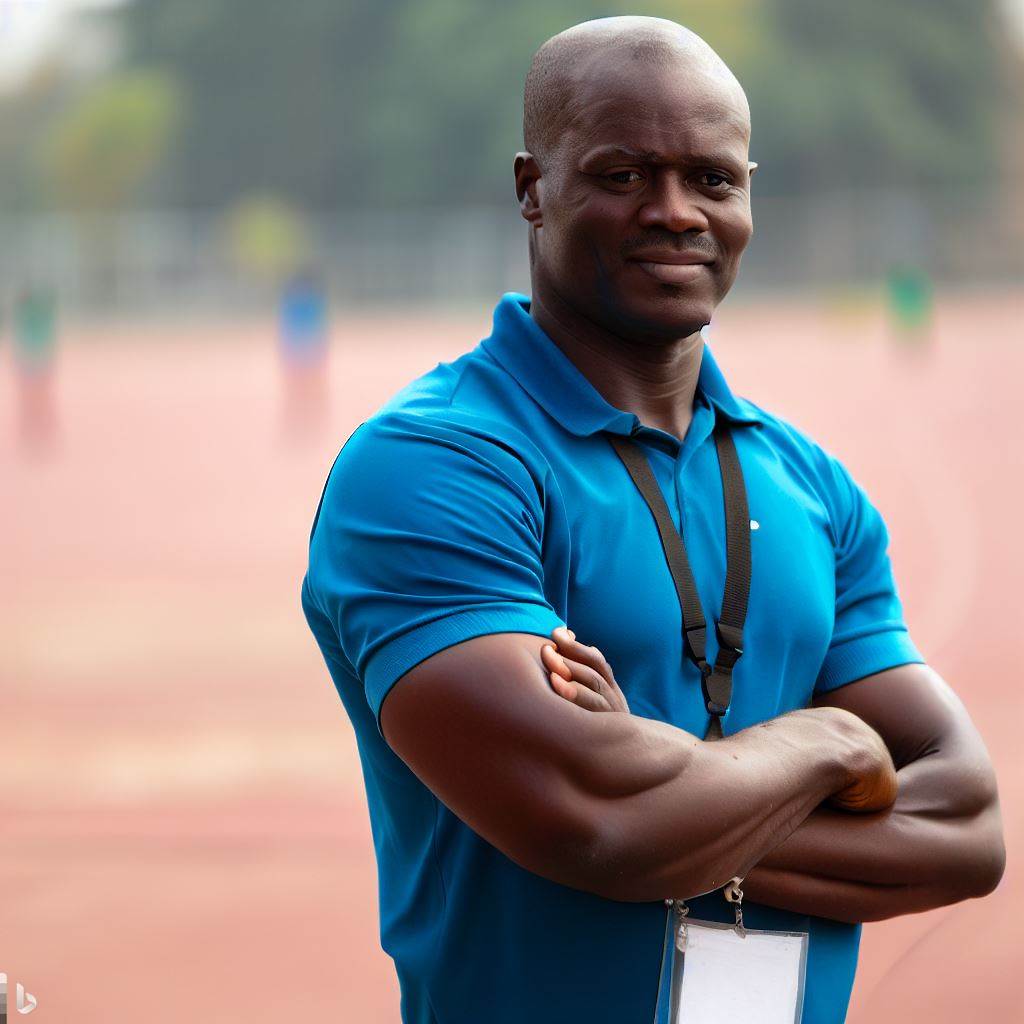Introduction
Athletic trainers play a crucial role in ensuring the well-being and performance of athletes in Nigeria.
This article aims to give readers a glimpse into the daily life of an athletic trainer in Nigeria.
Welcome to a glimpse into the world of athletic trainers in Nigeria.
This article aims to shed light on the daily routine of these dedicated professionals, offering a unique perspective on their demanding yet rewarding careers.
In Nigeria, athletic trainers play a pivotal role in the sports industry, ensuring athletes perform at their best while minimizing the risk of injuries.
Their job extends beyond the sidelines, encompassing various responsibilities that keep athletes in top shape.
Throughout this article, we’ll delve into the daily activities, challenges, and the impact athletic trainers have on Nigerian sports.
From assessing injuries to crafting personalized training regimens, they are the unsung heroes behind athletes’ success.
So, let’s step into their shoes and discover a day in the life of an athletic trainer in Nigeria.
Overview of Athletic Training in Nigeria
In recent years, the importance of athletic training has been steadily growing in Nigeria.
With the rise in popularity of sports and increased participation in physical activities, the need for qualified athletic trainers has become essential.
These professionals play a crucial role in preventing, diagnosing, and treating sports injuries.
Athletic trainers in Nigeria are highly skilled healthcare professionals who are specifically trained to work with athletes.
They possess a deep understanding of the human body and the mechanics involved in various sports.
Their primary goal is to ensure the overall well-being and peak performance of athletes.
When it comes to preventing injuries, athletic trainers take a proactive approach.
They work closely with athletes to develop personalized training programs that focus on injury prevention.
This includes teaching proper warm-up and stretching techniques, as well as providing guidance on nutrition and hydration to optimize athletic performance.
In the event of an injury, athletic trainers are there to diagnose and provide immediate care.
They are trained to assess the severity of injuries and determine the best course of action.
Whether it is applying first aid, recommending rehabilitation exercises, or referring athletes to specialized medical professionals, athletic trainers are prepared to handle any situation.
One crucial aspect of athletic training in Nigeria is the collaboration between athletic trainers and other healthcare professionals.
These trainers work closely with physicians, physiotherapists, and sports psychologists to ensure comprehensive care for athletes.
This interdisciplinary approach allows for a holistic treatment plan that addresses both the physical and mental well-being of athletes.
The role of athletic trainers extends beyond the field or court.
They also engage in research and education to stay up-to-date with the latest developments in sports medicine.
This continuous learning enables them to provide the best possible care to athletes and contribute to the advancement of athletic training in Nigeria.
A day in the life of an athletic trainer in Nigeria can be hectic but rewarding.
They start their day by reviewing athlete’s medical records and preparing for practice or game sessions.
During these sessions, they are constantly monitoring athletes for signs of fatigue or injury, providing immediate assistance when needed.
Additionally, athletic trainers often work long hours, including evenings and weekends, to accommodate practice and competition schedules.
They travel with teams to provide on-site care during away games and tournaments. This level of dedication and commitment is necessary to ensure the optimal performance and well-being of athletes.
In essence, athletic training in Nigeria is of growing importance, thanks to the increased emphasis on sports and physical activities.
Through their expertise in injury prevention, diagnosis, and treatment, athletic trainers play a vital role in the overall well-being of athletes.
Collaborating with other healthcare professionals further enhances their capabilities, while their continuous learning and research contribute to the advancement of the field.
In Nigeria, athletic trainers are truly dedicated to helping athletes perform at their best and recover from injuries effectively.
Read: Youth and Sports: The Role of Athletic Trainers in Nigeria
Educational Background and Training
Aspiring to become an athletic trainer in Nigeria? It’s essential to understand the necessary educational requirements, certifications, licenses, and specialized training involved in pursuing this career path.
Let’s dive deeper into what it takes to become a proficient athletic trainer:
Necessary Educational Requirements
To embark on a career as an athletic trainer in Nigeria, it is imperative to obtain a solid educational foundation.
Here are the necessary educational requirements:
- Obtain a minimum of a bachelor’s degree in athletic training or a related field.
- Major coursework should cover topics such as anatomy, physiology, kinesiology, and injury evaluation.
- Gain practical experience through internships or clinical rotations, preferably in sports medicine settings.
- Consider pursuing advanced degrees, such as a master’s or doctorate, to enhance career prospects and expertise.
The importance of obtaining relevant certifications and licenses
Acquiring the appropriate certifications and licenses is crucial for athletic trainers in Nigeria to provide high-quality care and ensure professional standards are met.
Here’s what you need to know:
- Obtain certification through relevant organizations, such as the National Athletic Trainers’ Association (NATA).
- Certification often involves passing an exam showcasing competence in various areas of athletic training.
- Register with the Medical Rehabilitation Therapists Board of Nigeria (MRTBN) to earn a license.
- Continuously engage in professional development activities to maintain and renew certifications and licenses.
Additional Specialized Training
Beyond the core educational requirements and certifications, athletic trainers in Nigeria can pursue specialized training in specific areas to further enhance their knowledge and skills.
Here are a few examples:
- Sports Performance Enhancement: Gain expertise in optimizing athletes’ performance through strength training and conditioning programs.
- Emergency Care and First Aid: Acquire advanced training in managing emergency situations and providing first aid to injured athletes.
- Rehabilitation Techniques: Develop skills in designing comprehensive rehabilitation programs to aid athletes in recovering from injuries.
- Nutrition and Sports Medicine: Expand knowledge on nutrition principles and their application in the sports medicine field.
Continuing Education and Professional Growth
As an athletic trainer in Nigeria, the journey doesn’t stop once you’ve acquired the necessary education, certifications, and licenses.
Continued learning and professional growth are vital components of a successful career in this field.
Here’s what you can do:
- Participate in workshops, conferences, and seminars to stay updated with the latest advancements in athletic training.
- Engage in research and contribute to the body of knowledge in sports medicine, expanding your expertise.
- Join professional organizations and networks to connect with fellow athletic trainers and share insights.
- Mentor aspiring athletic trainers to give back to the profession and help nurture future talent.
Basically, becoming an athletic trainer in Nigeria requires a solid educational foundation, obtaining relevant certifications and licenses, and pursuing specialized training.
Continual professional development is also essential for career growth and staying up-to-date with advancements in the field.
By fulfilling these requirements, aspiring athletic trainers can embark on a fulfilling and impactful career.
Read: Starting a Career as an Event Manager in Nigeria

Job Responsibilities
Athletic trainers play a crucial role in Nigeria, ensuring the fitness and well-being of athletes.
Their job responsibilities are diverse and demanding, covering various aspects of athletic training.
Let’s explore some of the key responsibilities of athletic trainers in Nigeria.
Pre-Participation Evaluations: Assessing Fitness Levels
One of the important responsibilities of athletic trainers in Nigeria is conducting pre-participation evaluations.
These evaluations involve assessing the fitness levels of athletes before they engage in sports activities.
By conducting thorough evaluations, trainers can identify any potential health issues or fitness limitations that may impact an athlete’s performance or put them at risk of injury during competitions.
Pre-participation evaluations typically include a comprehensive physical examination, medical history review, and fitness assessments such as strength, flexibility, and cardiovascular endurance tests.
These evaluations help trainers design appropriate training programs and provide necessary guidance and recommendations to enhance individual athlete’s performance and reduce the risk of injuries.
Injury Prevention Programs: Creating and Implementing
Another crucial responsibility of athletic trainers in Nigeria is the creation and implementation of injury prevention programs.
These programs are designed to identify and address factors that contribute to sports injuries, helping athletes stay healthy and safe.
Athletic trainers collaborate with coaches, athletes, and other healthcare professionals to develop comprehensive injury prevention programs.
These programs may include warm-up routines, stretching exercises, strength and conditioning training, nutrition advice, and safe playing techniques.
By incorporating these preventive measures, trainers can reduce the incidence of injuries, enhance athletes’ performance, and contribute to their overall well-being.
Assessing and Managing Sports-Related Injuries
Athletic trainers in Nigeria also have the responsibility of assessing and managing sports-related injuries during competitions.
They are trained to handle various types of injuries and immediate medical emergencies that athletes may encounter on the field.
When athletes sustain an injury, trainers are the first responders who provide initial evaluation and immediate care.
They assess the severity of the injury, provide first aid, and determine if further medical attention is required.
Trainers also collaborate with other healthcare professionals, such as doctors or physiotherapists, to develop treatment plans and oversee the rehabilitation process.
During competitions, athletic trainers are present on the sidelines, ready to address any injury or medical emergency promptly.
They play a crucial role in ensuring athletes receive the necessary care and support to recover from injuries and safely return to sports activities.
Lastly, athletic trainers in Nigeria have several vital responsibilities in ensuring the well-being and performance of athletes.
From pre-participation evaluations to injury prevention programs and managing sports-related injuries, these trainers play a crucial role in promoting athlete safety and overall wellness.
Their expertise and dedication contribute significantly to the success of sports events and the development of athletes in Nigeria.
Read: Comparing Biostatistician Roles: Nigeria vs. Globally
See Related Content: Key Skills for Success in Nigerian Sports Broadcasting
Discover More: Challenges in Assistant Athletic Training: Nigeria’s Scene
Work Environment
In Nigeria, athletic trainers typically work in a variety of settings and interact with different types of sports and athletes.
Here is an overview of their typical work environment:
Work Settings
- Sports Teams: Athletic trainers often find employment with professional sports teams, both at the national and club level.
- Colleges and Universities: Many athletic trainers are employed by educational institutions to support their athletic programs.
- Private Clinics: Some trainers work in private clinics that specialize in sports medicine and provide rehabilitation services.
- Hospitals: Certain athletic trainers may work in hospitals, particularly in departments that deal with sports-related injuries and surgeries.
- Physical Therapy Centers: Trainers may also be employed in centers that offer physical therapy services to athletes.
Types of Sports and Athletes
Athletic trainers in Nigeria have the opportunity to work with various sports and athletes, including:
- Football (Soccer): Football is the most popular sport in Nigeria, and athletic trainers are in high demand in the football industry.
- Basketball: The sport has been gaining popularity in Nigeria, and athletic trainers may work with basketball teams.
- Athletics: Trainers may work with track and field athletes, providing support and injury prevention strategies.
- Rugby: Athletic trainers may find employment with rugby teams, ensuring the well-being of the players.
- Tennis: Trainers may work with professional tennis players or be part of a tennis academy.
- Boxing: Athletic trainers may provide medical support and help with injury prevention and management in boxing.
- Other Sports: Trainers may also work with athletes involved in sports such as golf, swimming, volleyball, and more.
Regardless of the setting or the sport, athletic trainers in Nigeria play a crucial role in managing and preventing sports-related injuries.
They work closely with coaches, athletes, and medical professionals to ensure the overall well-being and optimal performance of athletes.
The work environment for athletic trainers can be dynamic and fast-paced, requiring them to be knowledgeable, adaptable, and responsive.
It may involve traveling with teams, attending competitions, and being available during irregular hours, including weekends and holidays.
Overall, athletic trainers in Nigeria have a challenging yet fulfilling work environment.
They have the opportunity to make a significant impact on athlete’s lives and contribute to the growth and success of sports in the country.
Publish Your Professional Profile, Business or Brand
Showcase your expertise, gain trust, and boost visibility instantly on Professions.ng.
Publish NowRead: Marketing Yourself: Nigerian Coaching Guide
Challenges and Rewards
Challenges Faced by Athletic Trainers in Nigeria
- Limited Resources: Athletic trainers in Nigeria often face challenges of limited resources, including equipment, facilities, and medical supplies.
- Lack of Funding: Due to limited financial support, athletic trainers struggle to provide optimal care for athletes.
- Inadequate Training Centers: There is a lack of specialized training centers for athletic trainers, which affects their ability to enhance their skills and knowledge.
- Political Interference: Athletic trainers sometimes face interference from politicians, which hampers their ability to make decisions based on athletes’ needs.
- Cultural Beliefs: Cultural beliefs and traditional practices often clash with modern sports science, making it challenging for athletic trainers to implement evidence-based practices.
Rewards of Being an Athletic Trainer in Nigeria
- Helping Athletes: One of the most rewarding aspects of being an athletic trainer is the ability to help athletes prevent and overcome injuries.
- Impacting Sports Performance: Athletic trainers play a crucial role in improving sports performance by providing injury prevention strategies and rehabilitation programs.
- Building Relationships: Through their work, athletic trainers develop strong relationships with athletes, coaches, and other healthcare professionals.
- Personal Satisfaction: The satisfaction derived from seeing athletes recover from injuries and return to the field is immensely rewarding.
- Continuous Learning: The field of athletic training is constantly evolving, offering trainers opportunities for professional and personal growth.
In general, athletic trainers in Nigeria face numerous challenges, including limited resources, funding, inadequate training centers, political interference, and cultural beliefs.
However, despite these obstacles, the rewards of being an athletic trainer in Nigeria are significant.
They include the satisfaction of helping athletes, impacting sports performance, building relationships, personal fulfillment, and the continuous learning opportunities available in the field.
Conclusion
Being an athletic trainer in Nigeria requires dedication, expertise, and a strong work ethic.
Athletic trainers play a crucial role in ensuring the well-being and performance of athletes.
Throughout the article, we highlighted the daily tasks and challenges faced by athletic trainers in Nigeria.
From providing injury prevention and rehabilitation to working alongside coaches, they are crucial in maintaining athletes’ physical health.
The sports industry in Nigeria greatly relies on the expertise of athletic trainers to ensure that athletes perform at their best while minimizing the risk of injuries.
We should appreciate the hard work and dedication of athletic trainers who go above and beyond to ensure that athletes are in optimal health.
Their contribution to Nigerian sports cannot be overstated.
In summary, as readers and sports enthusiasts, it is important to recognize and support the role of athletic trainers in Nigeria’s sports industry.
Their commitment to athlete well-being helps in shaping the success and growth of sports in the country.




